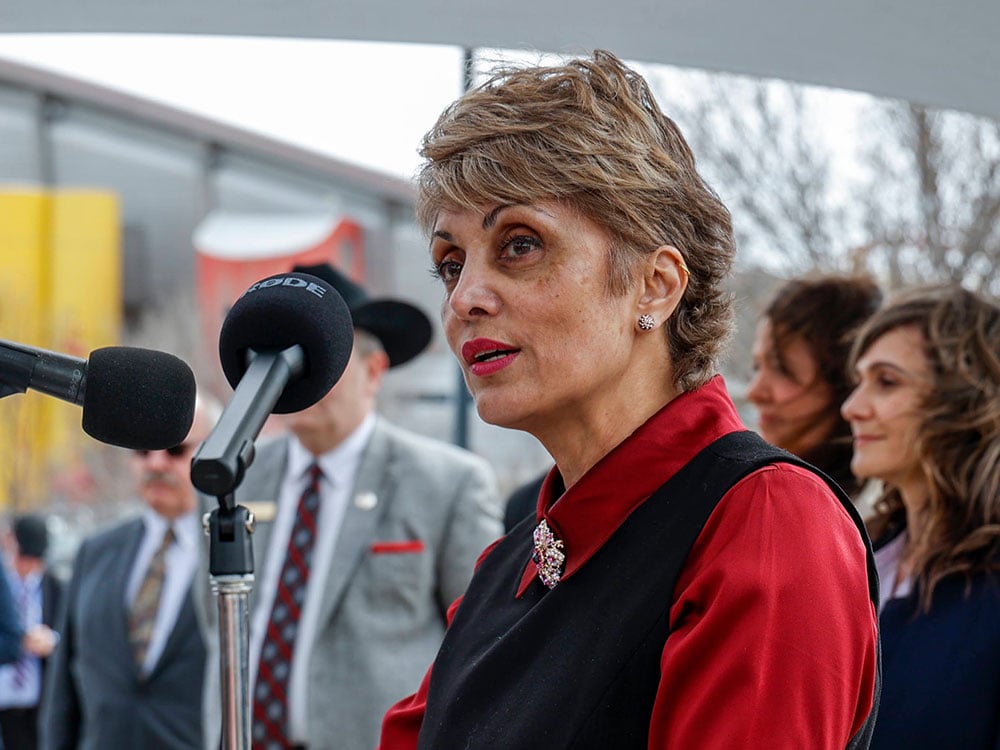We may be living in the 21st century, but Premier Danielle Smith’s United Conservative government is apparently still suffering from the 19th century distrust of voters and democracy that convinced the Fathers of Confederation to give us that unelected Senate.
So Thursday Municipal Affairs Minister Ric McIver introduced Bill 20, the Municipal Affairs Statutes Amendment Act, legislation clearly intended to get voters, especially in Alberta’s two biggest cities, to stop electing progressive city councillors who are not in lockstep with the UCP’s increasingly authoritarian policies.
The legislation encourages the introduction of parties to municipal politics in Edmonton and Calgary in the obvious hope that will make it easier for well-financed Conservatives to finally get a death grip on the province’s two most important city halls.
Never mind that polling last year by pollster Janet Brown indicated that 68 per cent of respondents opposed the idea of municipal parties. What voters want is obviously not top of mind for the UCP brain trust.
Regulations have not yet been created, so it is not yet clear exactly how this will work. But when passed, a certainty given the UCP majority in the legislature, Bill 20 will also remove the NDP’s ban on corporate and union money flowing to municipal candidates. (Separate UCP legislation already interferes with unions’ ability to make donations.)
In the event such changes don’t deliver the results the UCP wants, Bill 20 also introduces heavy-handed provisions that will allow the provincial cabinet to subject mayors and councillors with whom they disagree to referenda, boot them out of office and arbitrarily nullify bylaws on ideological or even whimsical grounds.
Presumably the UCP hopes the threat of a cabinet-sanctioned city hall coup would be enough to get municipal councillors to knuckle under without having to implement the provisions of the act, sparking expensive and inconvenient legal challenges.
This was obviously Calgary Mayor Jyoti Gondek’s fear Thursday when she asked, in a statement, “Are we now in a world where elections can be bought by big money, and elections can be overturned by a cabinet that doesn’t like the results?”
The answer is yes — or, at least, we will be as soon the bill is passed.
Naturally, as we have come to expect from the UCP, McIver introduced the bill by claiming its purpose is the opposite of what it appears to be.
“Our government is committed to strengthening Albertans’ trust in their local governments and the democratic process that elects local leaders,” he was quoted saying in the government’s press release.
“The changes we are making increase transparency for Alberta voters and provide surety their votes will be counted accurately,” he continued. There is no evidence that votes in municipal elections have been counted inaccurately, as McIver, a former Calgary city councillor surely knows.
“We know how important local democracy is to Albertans, and we will work with local authorities to protect and enhance the integrity of local elections,” he said, implying that there’s something hinky in the fact voters in Edmonton and Calgary keep electing progressive council members.
How enabling local democracy to be easily overruled is consistent with knowing how important it is to Albertans is an interesting question that will likely remain unresolved.
“With every bill, they’re making it more difficult to call them conservative, and tougher to avoid the label authoritarian,” observed University of Alberta political scientist Jared Wesley on social media Thursday.
While agreeing the goal of the legislation is to “make it clear who’s the boss,” Calgary Herald political columnist Don Braid also saw a darker motivation for the legislation, accusing the government of trying to lay the groundwork for eventual Alberta sovereignty.
In a statement to media that mocked Conservative talking points, NDP municipal affairs critic Kyle Kasawski called Premier Danielle Smith Alberta’s “gatekeeper-in-chief.”
“Municipal councils are not a farm team for the UCP to carry out their wishes at the municipal level,” he said. “What municipalities need are appropriate funds so that they can fix the crumbling infrastructure in their communities and to pay for the programs that Albertans deserve.”
Smith, as long-time a foe of vaccines and an enthusiastic advocate of quack COVID cures, is particularly keen to prevent municipal governments from imposing health and safety measures that might irritate the UCP’s MAGA base.
Indeed, McIver admitted as much during yesterday’s news conference. Can you imagine, he said, Edmonton tried to impose a local COVID mask mandate during the pandemic!
Among other changes to the Local Authorities Election Act and the Municipal Government Act enabled by the bill will be an unneeded ban on the use of electronic vote-counting machines, presumably because U.S. Republicans are doing the same thing, and allowing the minister to overrule municipal officials’ decisions on the validity of recall petitions.
Bill 20 will also permit subsidized affordable housing to be exempted from both municipal and education property taxes, thereby transferring the tax burden from developers and senior governments to middle-class homeowners. The increase in taxes resulting, presumably, will be blamed on progressive councils. ![]()
















Tyee Commenting Guidelines
Comments that violate guidelines risk being deleted, and violations may result in a temporary or permanent user ban. Maintain the spirit of good conversation to stay in the discussion and be patient with moderators. Comments are reviewed regularly but not in real time.
Do:
Do not: